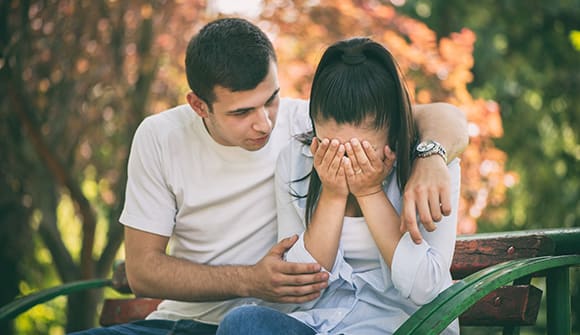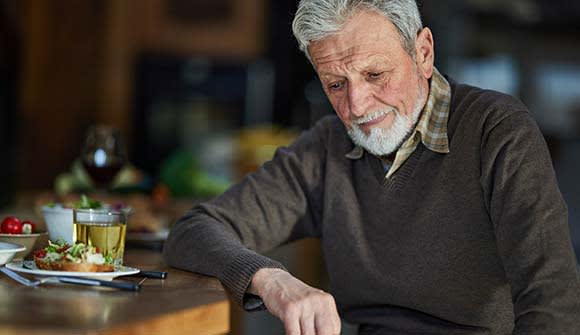Steps to brighter days
Grieving the death of a loved one takes time.
Article Date:

Coping with the death of a loved one is never easy.
It’s something we all go through in life.
Grief comes in many forms and every person handles grief in a different way.
While the sadness and void can be overwhelming, there will be brighter days. And most importantly, grieving is normal and there is no timetable for healing.
“You don’t get over it, but you learn to live through it,” said Linda Rosengren, CT, CPLC, chaplain and bereavement services coordinator with Spiritual Care for Baptist Medical Center Jacksonville and Wolfson Children’s Hospital. She is certified in perinatal loss care and Thanatology, which includes death education and bereavement counseling.
Everyone’s mourning process is different
“Grief is a normal process. No two people’s grief looks the same and no one can say how long grief lasts,” added Amy N. Johnston, a licensed clinical social worker (LCSW) and behavioral health therapist with Baptist Behavioral Health. “It’s personal to each person. Two people in the same family can mourn and grieve very differently. We have to respect each person’s process.”
Grief can affect people both physically and psychologically, such as depression, anxiety, stomach pain, loss of appetite, loss of energy and sleep issues.
While some people may go through phases such as depression, anger, denial and isolation, there is no defined process for each person.
“It’s like a roller coaster. You are going to have ups and downs and in between during various phases for a period of time,” Johnston said.
Steps to help with healing
Both Rosengren and Johnston shared some ways to help those who are grieving.
- Be kind and gentle to yourself.
- Allow yourself to feel. Your feelings are valid.
- Take care of your own health.
- Take time for yourself.
- Find a support system, whether it’s friends, family or a support group.
- Go for a walk and get fresh air.
- Be sure to get rest.
- Write or draw your thoughts on paper.
- Create a box of memories of your loved one.
- Do yoga or meditation.
- Postpone any life-changing decisions until you feel ready.
- Be patient; it’s a process.
“What to do while you’re healing is not a one size fits all. These are just an offering of different things people can do,” Rosengren said. “Just be kind to yourself. Don’t think you are going to be the same person you were before you experienced the loss.”
Johnston said a memory box, for example, is helpful for adults and children to be able to remember happier times. It can be an old shoebox which can be personally decorated with photos inside, a journal to write how you are feeling and other mementos. Children may want to put a stuffed animal inside that they can talk to and touch and feel, she said.
“People have a tendency to solely remember the death and not the life when they are grieving and forget to remember the good times. A memory box is a way to stay connected to the person they lost,” Johnston said.
Seeing a doctor or mental health therapist may be helpful, Johnston said, if an individual’s grief over the long term becomes overwhelming to the degree that the person can’t function in day-to-day life; the anxiety and depression are getting worse, and he or she isn’t able to concentrate.
Finding the words to help
For friends and family, finding the words to help someone who is grieving can be a challenge.
“I always tell people there is not much we can say. All we can do is to be there to support them and listen to them when they need to talk and be patient with them,” Johnston said.
Be there also for the long term.
“When someone dies, everyone tends to swoop in all at once in the first week or month, but three to six months after and a year after, people are missing,” Johnston said. “Everyone wants to be there in that moment, but sometime people need their friends and family more in the long term.”
Rosengren added the most important thing friends and family can do is to be present.
Instead of asking, for example, “Let me know what you need or how can I help?” it may help to drop off dinner or take the kids for a play date.
“Sometimes people don’t know what they need. Just being available for them is important,” Rosengren said.
Holiday triggers
Grief will come in waves or triggers such as holidays, anniversaries and birthdays.
Turning those days into remembrance events can help to honor a loved one, whether it’s putting a special ornament on a Christmas tree in their loved one’s name, lighting a candle or going to the cemetery.
Johnston eats a peanut butter and jelly sandwich every year on her grandmother’s birthday, something the two enjoyed eating together.
“It can be as simple as that. It helps in honoring your loved one to remember special times with them. You get to feel that closeness to them again,” she said.
Baptist Behavioral Health values the importance of your mental and emotional health providing care for adults and children. A patient coordinator is available at 904.376.3800. The Spiritual Care Department also assists the health system and the community with holistic treatment of body, mind and spirit. Chaplains minister from a multi-faith perspective and can assist in contacting a faith resource person of your preference.



